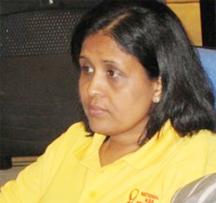Guyana is not one of the countries which will suffer from the cut-back of funding to fight HIV and AIDS, TB and malaria by Global Fund, as it has already received an invitation to apply for money under Phase 2 of the fund’s Rolling Continuation Channel (RCC), Director of the National Aids Programme Secretariat (NAPS) Dr Shanti Singh said.
“We are not one of the countries that would lose funding because we have already received an invitation to apply for funding under Phase 2, and normally invitations are sent to countries which are performing,” Dr Singh told the Sunday Stabroek recently.

Guyana is at present benefiting from the $12.6B it had received under Phase 1 of the RCC in 2009 which is set to come to an end next year, and once its application – which must be submitted by July 1 – finds favour, it will receive further funding that will run for six years.
The RCC is different from the grants accessed annually in November known as the ‘Rounds-Based Channel.’ According to the Global Fund, while its board approves the rolling continuation of funding proposals for the entire term of the proposal, there would only be a financial commitment for the initial three years. Funding for the other three years will be subject to the approval of the board based on a mid-point performance review.
Recently the Geneva-based fund which provides a lot of the international financing to combat HIV, TB and malaria, announced a review of its procedures after reporting “grave misuse of funds” in four recipient nations.
In March the fund appointed a new head and was forced to cut back, and said it would provide no new grants or funding until 2014. Until then, any low- and middle-income countries which have Global Fund grants which expire can apply for emergency maintenance funding to tide them over.
However, while the country is expected to continue to receive major funding from Global Fund, Dr Singh revealed that the five years of funding it had received from the World Bank was coming to an end. She explained that the funding had covered work that was projected in the last strategic plan and it supported infrastructure work and one-time projects.
She explained that all of the equipment that went into the National Public Health Laboratory was covered by the World Bank funding. And the funding the country received under the US President’s Emergency Plan for AIDS Relief (PEPFAR) – a US government initiative to help save the lives of those suffering from HIV/AIDS around the world – may also be reduced as the programme is changing. Dr Singh noted that the funding the programme now provides is not as it was 15 years ago, and she said it is not clear what further funding Guyana would receive under the programme.
She revealed, however, that a mission from the US is at present in the country to meet with officials. This mission is expected to advise Guyana on what kind of funding it would receive under the programme in the next two to three years. She said the country is still benefiting from some existing funding from the programme.
PEPFAR had announced that a new strategy is underway in its second phase programme which supports the US government’s overall emphasis on improving health outcomes, increasing programme sustainability and integration, and strengthening health systems. According to the programme it will work closely with country teams in order to “translate, prioritize, and implement this strategy in a manner appropriate to the country context.”
The $12.6B under the RCC the country had received from the Global Fund, which it was given in two tranches, was expected to be used in the country’s HIV programme in areas such as treatment, voluntary counselling and testing (VCT) and Prevention of Mother to Child Transmission (PMTCT). Former Minister of Health Dr Leslie Ramsammy had explained that US$2M from the first tranche would have being given to non-governmental organisations.
According to the Global Fund’s website, the RCC was created in November “for well performing grants to apply for continuing funding for up to an additional six years beyond the original proposal term.” It stated that the RCC “is an invitation-only proposal process, for qualified applicants with strong performing, existing Global Fund grants.”
This is the first time Guyana will access funds under the RCC mechanism.
The grant under the RCC, according to the fund, will allow for scale-up and programme expansion under the overall goals of the original grant.
The RCC is also seen as a mechanism which creates a positive “incentive for strong performance by reason that continued funding under this channel is more streamlined and attractive (eg funding length and funding priority) than the Rounds-Based Channel.”
When the board made the decision to approve the RCC grant mechanism it saw it as one that would provide longer-term financing towards “national attempts to ensure sustainability of interventions that will have a long-term impact on the three diseases, as demonstrated by a grant contributing to broadly developed, inclusive, long-term national plans” to prevent and control AIDS, tuberculosis and malaria.




